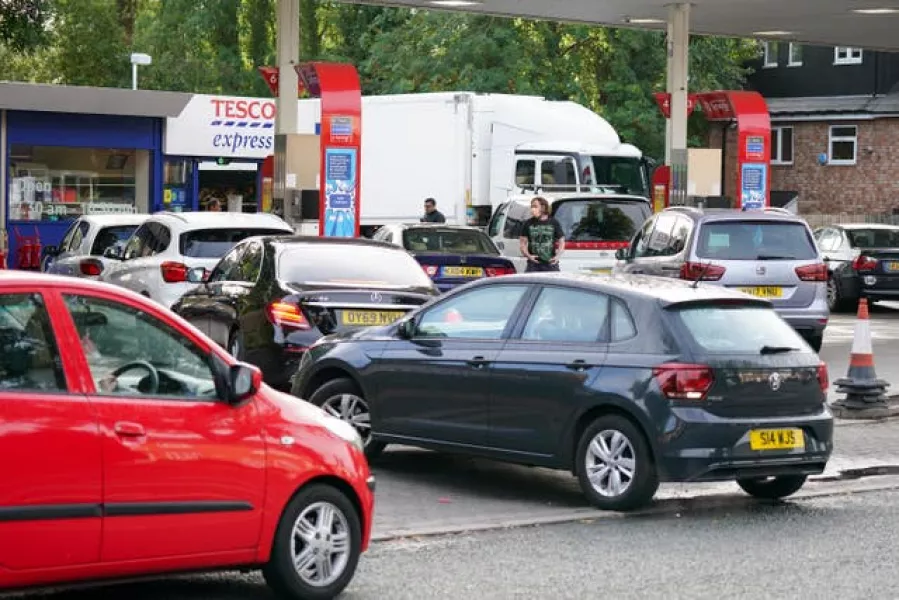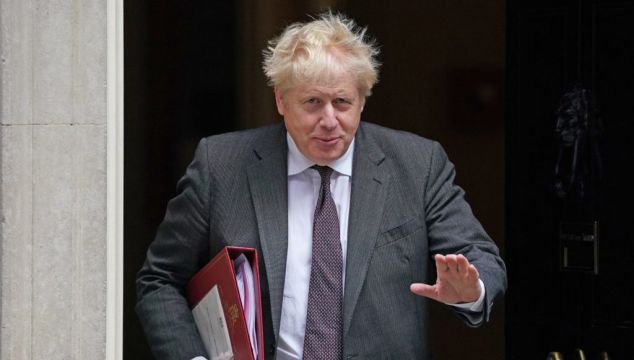Boris Johnson has said the situation on the UK's filling station forecourts is “stabilising” as he urged motorists to go about their business in the normal way.
Following days of chaos, with long queues for petrol and stations running dry, the British prime minister said he understood the frustration felt by drivers as they struggled to fill up.
However, he said that the indications from the industry were that the situation was beginning to improve with supplies returning to normal levels.
“On the forecourts the situation is stabilising and people should be confident and just go about their business in the normal way,” he said in a pooled interview with broadcasters.
His appeal came as UK Labour Party leader Keir Starmer accused the British government of reducing the country to “chaos” through its failure to deal with the fuel crisis.
The Labour leader said the haulage industry was “beyond frustrated” at the lack of a clear plan by ministers to alleviate the problems caused by the shortage of tanker drivers.
“The Government has reduced the country to chaos as we track from crisis to crisis. The Government is not gripping this,” he told BBC News.

“This problem was predictable and predicted and the Government has absolutely failed to plan.”
But with the Petrol Retailers Association (PRA) reporting “early signs” that the crisis was coming to an end, the UK prime minister expressed confidence the worst was over.
Mr Johnson said the British government was putting in place measures to ensure the entire supply chain could cope in the run-up to Christmas.
“I want to say first of all how much I sympathise with people who have been worried about their journeys, worried about whether they will be able to use their cars in the normal way,” he said.
“I know how frustrating and worrying it must have been to worry about a shortage of petrol and fuel.
“We are now starting to see the situation improve. We are hearing from industry that supplies are coming back on to the forecourts in the normal way.
“What we want to do is to make sure we have the preparations necessary to get through to Christmas and beyond, not just in the supply of our petrol stations but all parts of our supply chain.”
Mr Johnson rejected calls for healthcare staff and other workers to be given priority access to fuel, suggesting it was unnecessary given the easing of the situation.
After the UK government announced it would be issuing 5,000 temporary visas to foreign lorry drivers to alleviate the shortages which led to the crisis, he also dismissed demands for more overseas workers to be admitted.

“What we want to see is a an emphasis on a high wage, high skill, high productivity approach to our economy,” he said.
“What I don’t think people in this country want to do is fix all our problems with uncontrolled immigration.
“We tried that for a long time and in the end, people could see that it was leading to a low wage, low skill approach without enough investment in people or in equipment.
“That’s not the way we want the UK to develop and grow.”
His comments came after British transport secretary Grant Shapps acknowledged that Brexit, which cut off the supply of drivers from the EU, had been a “factor” in the crisis.

“No doubt it will have been a factor.
“On the other hand it has actually helped us to change rules to be able to test more drivers more quickly,” he told broadcasters..
“So, it has actually worked in both ways.”
Meanwhile PRA executive director Gordon Balmer said the numbers of filling stations reporting they had run dry was falling as fuel deliveries recovered.
“There are early signs that the crisis at pumps is ending, with more of our members reporting that they are now taking further deliveries of fuel,” he said.
“We have conducted a survey of our members this morning and only 37% of forecourts have reported being out of fuel today.
“With regular restocks taking place, this percentage is likely to improve further over the next 24 hours.”
Ministers have insisted throughout the crisis that fuel stocks remain high and that panic buying was unnecessary.
They argued the sudden surge in demand was driven by reports of of a shortage of a small number of tanker drivers leading to some hold-up in deliveries.
Nevertheless the UK government announced on Monday that it was putting troops on standby to drive tankers as a “precautionary step” if problems persisted.
But with long queues for petrol continuing some senior Tories urged ministers to go further and begin actively deploying the military to restore public confidence.
The chairman of the Commons Defence Committee Tobias Ellwood told Sky News: “Simply hoping this situation will return to normal is not a strategy.
“I believe the Army should not just be put on standby but in fact mobilised, be seen to be used.
“That will help ease the pressure on shortages of course, it will return public confidence.”







